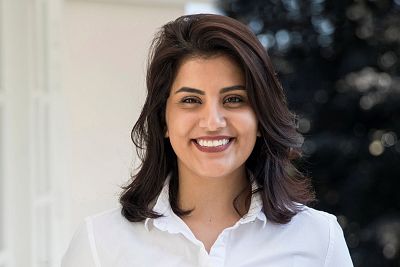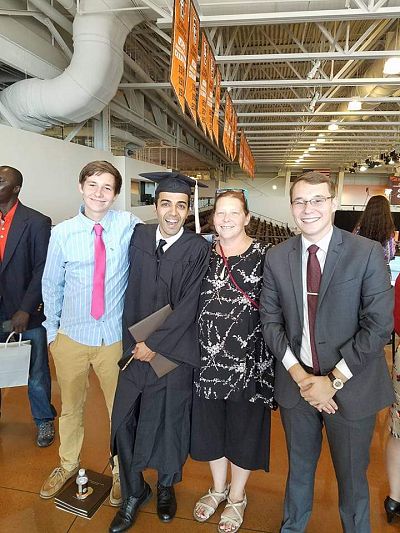Originally published on the Euronews website, bMay 1 2019
NEW YORK — An unmarked car sat in the street waiting overnight for Ayman al-Drees before following the U.S.-educated insurance underwriter on the 15-minute drive to his family’s date farm.
The men inside weren’t wearing uniforms, he told his wife over the telephone. He was in eastern Saudi Arabia, she was in Los Angeles.
“He told me, ‘I love you. Take care of yourself,'” said Malak al-Shehri, who lives in New York.
Al-Drees, 31, was detained by Saudi authorities hours later, according to human rights advocates. The Saudi government did not respond to requests for comment on the whereabouts of al-Drees or his case.
It is not known why al-Drees was arrested on April 4. The graduate of Ohio’s Bowling Green State University had not recently spoken out about human rights or political reform, but he had chosen to marry a feminist.
His wife first came to public attention in December 2016 when al-Shehri posted on Twitter a picture of herself in a Riyadh street without a headscarf and abaya, the mandatory all-encompassing covering for women. It was a clear act of defiance in the ultra-conservative kingdom.
While some online dubbed al-Shehri a Saudi Rosa Parks, insults and death threats also flooded social media. She was detained and charged with cyber crimes and encouraging others to also take a stand against the kingdom’s dress codes. After five days in jail, she was released.
Al-Shehri, 35, spoke to NBC News after her shift as a waitress at a restaurant a couple blocks from New York’s Penn Station. It was close to midnight.
Her eyes frequently filled with tears as she talked, although her gaze and voice remained steady as she remembered the day her husband vanished in Saudi Arabia.
“I asked him, ‘Are you scared?'” she said, recalling their conversation.
Al-Drees assured her that in the long run everything would be fine, al-Shehri said. But he was very sorry he hadn’t listened when she begged him to leave Saudi Arabia.
Al-Shehri’s bravery in posting the photo on Twitter had captivated al-Drees. He contacted the activist to express his support and admiration.
During their online courtship he told her: “I’m going to come over and get married to you.”
The couple wed in April 2017.
“He loves strong women,” al-Shehri said, flashing a bright white smile.
“He’s so charming, so cute,” she added. “All the girls love him.”
At around this time she had begun to hope Saudi Arabia was changing thanks to reforms driven by the crown prince. The government had defanged the country’s powerful religious police, and was opening the way for women to drive.
But their life together in Saudi Arabia turned upside down in May 2018, when a handful of women with activist backgrounds and men who supported them were arrested weeks before the country dropped its ban on women driving.
“I got so scared,” al-Shehri said. “That’s when we knew we are in a new era.”
She fled the country within days, and currently is in the U.S. where she had spent time attending college.
Among those arrested included Loujain al-Hathloul, a leading campaigner for the right for women to drive. Al-Hathloul and other women and men were held without charge from May until March this year, when prosecutors accused them of trying to “undermine the kingdom’s security, stability, and national unity.”
An investigation by Human Rights Watch and Amnesty International contend that authorities tortured and sexually assaulted some detainees. The Saudi prosecutor has said his office investigated the allegations of torture and mistreatment and concluded they were false, according to Reuters.
The beheadings of 37 mainly Shiites last week — Saudi Arabia is majority Sunni Muslim — reiterated the chasm between the vision of a “modern” Saudi Arabia touted by the crown prince and the reality on the ground.
Adam Coogle, a Middle East researcher at Human Rights Watch, said while Saudi Arabia does detain and prosecute people associated with groups such as al Qaeda and the Islamic State, “the same anti-terrorism apparatus also targets peaceful dissidents and human rights activists, subjecting them to unfair trials and convictions based solely on torture-tainted confessions.”
For al-Shehri, discussing her husband publicly is agonizing — and potentially dangerous, she believes.
“Every tweet I write I am scared it will affect him,” she said.
Al-Drees was one of at least 14 people who are not considered front-line activists arrested in Saudi Arabia the week of April 4, according to human rights advocates. However, those detained are considered supportive of women’s rights or have ties to jailed activists. The Saudi government has not commented on any of the cases.
In speaking out about her husband, al-Shehri is pitted against some of the world’s most powerful people — the leaders of the U.S. and Saudi Arabia.
The White House views Saudi Arabia as key to President Donald Trump’s regional ambitions.
While the killing of Khashoggi by Saudi agents and the detention of activists has prompted afirestorm of criticism, the Trump administration has stood by its alliance with the kingdom.
Secretary of State Mike Pompeo says he pressed Saudi Arabia after last month’s detentions of al-Drees and others, including two dual U.S.-Saudi citizens.
While al-Drees studied in the U.S., he does not hold an American passport.
Aidan Hubbell-Staeble became close friends with al-Drees while they were both attending Bowling Green State University. Like al-Shehri, he has also decided to go public.
“We’re all just extremely worried about him,” Hubbell-Staeble said. “We’re all just scared s***less.”
A statement issued by the office of Bowling Green State University President Rodney Rogers said he was “concerned about al-Drees” and “keeping his wife and family in our thoughts during this difficult time.”
This is of little comfort to al-Shehri who muses about “if” her husband is returned to her. It wasn’t supposed to work out like this.
“He always lived safe. I am the reckless one,” she said.
Link to the original post:
https://www.euronews.com/2019/05/01/malak-al-shehri-speaks-out-after-saudi-arabia-detains-husband-n999976






